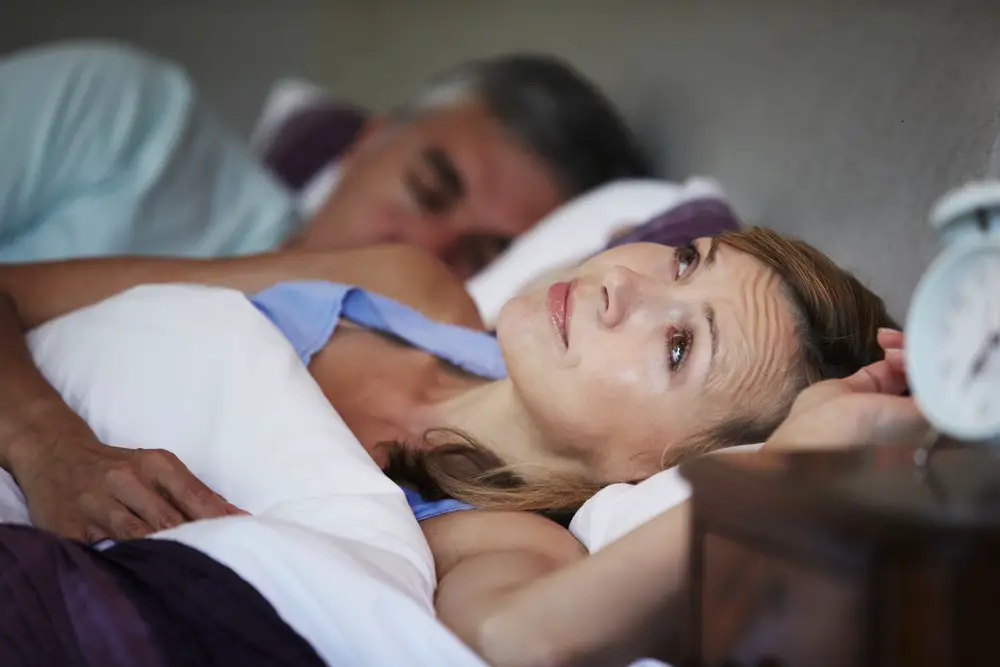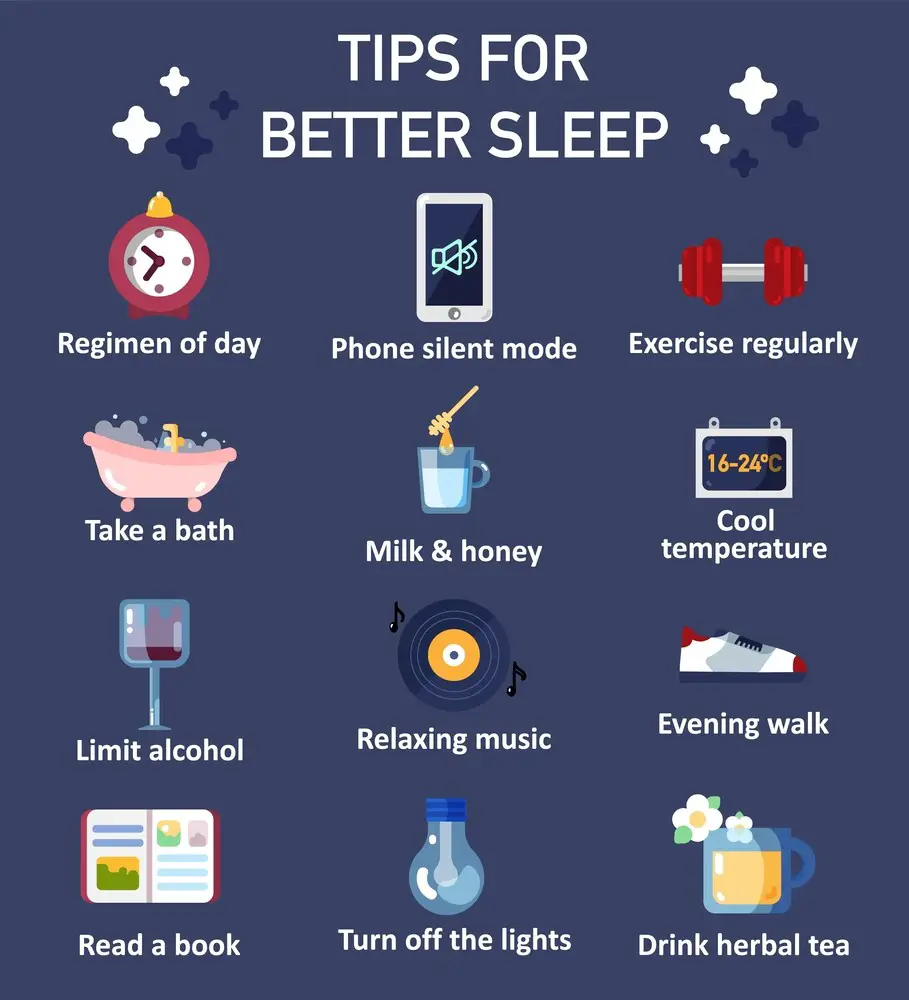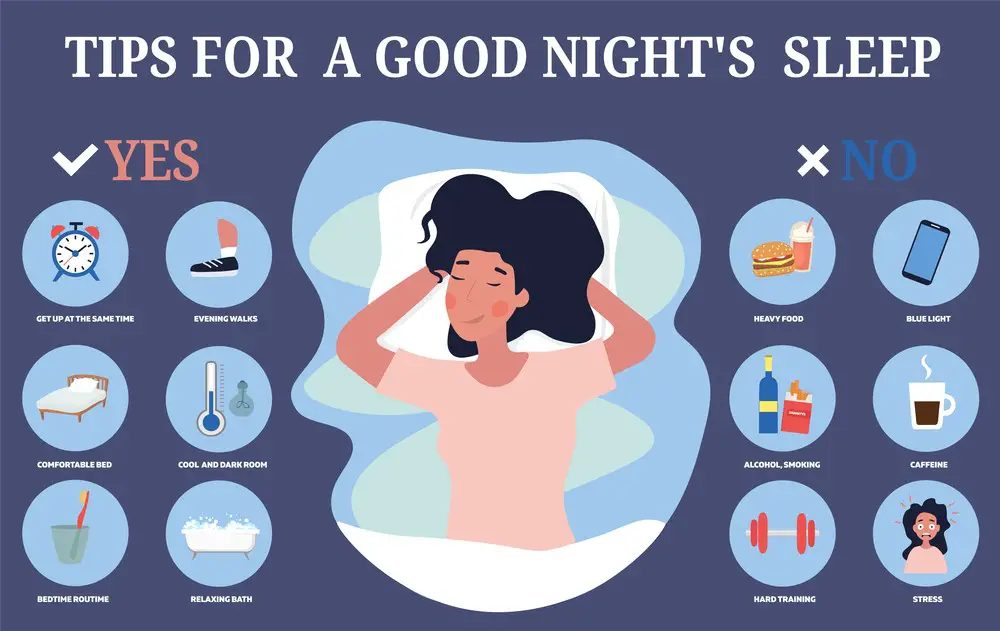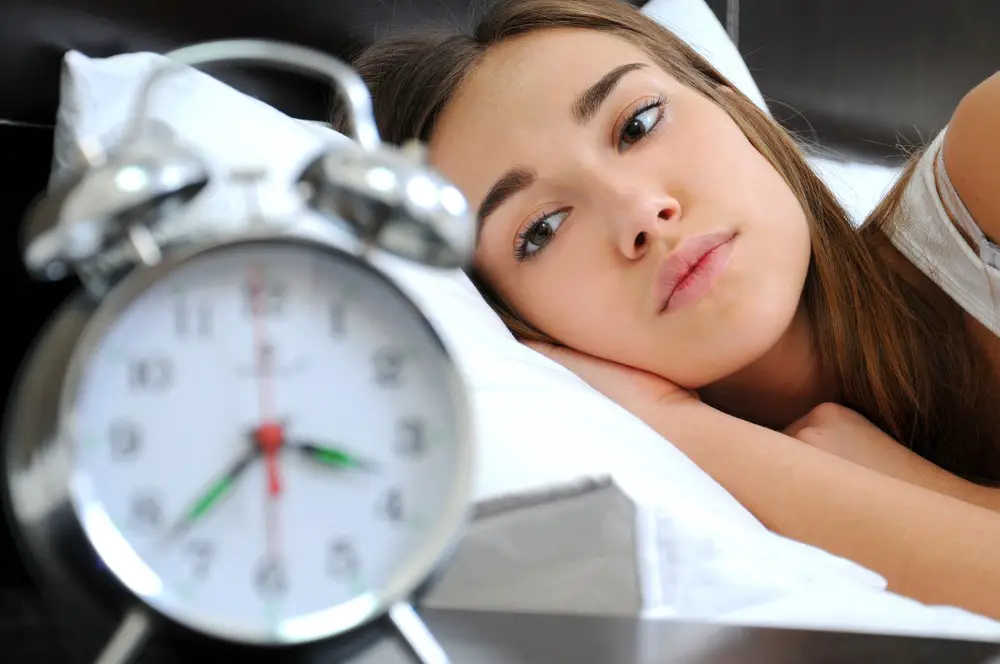As a BetterHelp affiliate, we receive compensation from BetterHelp if you purchase products or services through the links provided
Many struggle with the frustrating issue of being unable to sleep at night, even when exhausted. This common problem can be both confusing and distressing, as it may seem like there should be no obstacle preventing one from drifting off to sleep. There are several reasons why an individual might experience this difficulty, some of which may be more obvious than others.
One possible explanation for this unwanted wakefulness is the body’s internal clock or circadian rhythm. External factors such as screen exposure, inconsistent sleep schedules, or shift work can disrupt this natural cycle, causing a person to feel tired yet remain unable to fall asleep. In other cases, stress and anxiety might be the culprits, keeping the mind alert and active when it should be winding down for the night.
Understanding the causes of sleeplessness is crucial in finding effective solutions to improve sleep quality. Addressing these issues may involve lifestyle changes, relaxation techniques, or seeking professional help. It’s important to remember that better sleep is attainable, and finding the right approach can significantly affect one’s overall well-being.
Understanding Sleep Problems

Insomnia
Insomnia is a common sleep problem where individuals have difficulty falling asleep or staying asleep, even when they feel tired. This may be due to an imbalance in melatonin production, a hormone responsible for regulating sleep-wake cycles and promoting sleepiness. Stress and anxiety may also contribute to insomnia.
Delayed Sleep Phase Syndrome
Delayed Sleep Phase Syndrome (DSPS) is another sleep issue that affects the body’s internal clock or circadian rhythm. This condition causes individuals to have a delayed sleep-wake cycle, making it difficult to fall asleep at the desired time and wake up later. Factors such as exposure to bright light in the evening or a lack of morning light exposure may contribute to this condition. Maintaining a regular sleep schedule and practicing good sleep hygiene to help adjust the circadian rhythm is essential.
Sleep Disorders
Various sleep disorders may also be the reason for the difficulty in falling asleep. Some common examples include:
- Sleep Apnea: A disorder where breathing repeatedly stops and starts during sleep, often causing awakenings and subsequent daytime sleepiness.
- Restless Legs Syndrome (RLS): A condition characterized by an irresistible urge to move the legs, usually because of uncomfortable sensations, making it difficult to fall asleep.
- Narcolepsy: A chronic neurological disorder that affects the brain’s ability to control sleep-wake cycles, resulting in excessive daytime sleepiness and sudden episodes of muscle weakness or sleep attacks.
Factors Affecting Sleep Quality
Mental Health
Mental health plays a significant role in sleep quality. Conditions such as anxiety, depression, and stress can cause sleep disturbances. Anxiety can lead to racing thoughts and an increased heart rate, making it difficult to fall asleep. Depression often involves irregular sleep patterns and can be linked to insomnia or hypersomnia. Stress elevates cortisol levels, which can disrupt sleep cycles.
Physical Health
Various physical health conditions and associated pain can impact sleep quality. Chronic pain, for example, can make it challenging to find a comfortable sleeping position. Additionally, certain medications or treatments, including those for sleep apnea, acid reflux, and asthma, can interfere with sleep.
Age, menopause, pregnancy, and menstrual cycles can also affect sleep. As people age, they tend to experience lighter, more fragmented sleep. Hormone fluctuations during menopause, pregnancy, and menstrual cycles can lead to sleep disturbances such as insomnia or increased daytime sleepiness.
Lifestyle Factors
Lifestyle factors like caffeine intake and other stimulants can significantly impact sleep quality. Consuming caffeine too close to bedtime can make it difficult to fall asleep and reduce overall sleep quality. The impact of caffeine varies from person to person, but it’s recommended to avoid it in the hours leading up to bedtime.
Environmental Factors
Sleep quality can be influenced by environmental factors such as light, noise, and temperature. Exposure to blue light from screens and devices close to bedtime can suppress melatonin production, leading to difficulty falling asleep. Noisy environments or those with too much light can prevent restorative sleep. Ideal sleep environments should be quiet and dark and maintain a comfortable temperature to promote optimal sleep quality.
Sleep and Mental Health

Sleep and Anxiety
Sleep plays an essential role in maintaining optimal mental health. A lack of adequate sleep can exacerbate anxiety and other mental health conditions. Anxiety itself can disrupt sleep patterns, creating a vicious cycle. Prioritizing good sleep hygiene and addressing anxiety issues is crucial to ensure a restful night. Many people find practicing relaxation techniques and maintaining a consistent bedtime routine helpful in reducing anxiety-induced sleep difficulties.
Sleep and Depression
Depression is another mental health condition that can significantly affect sleep quality. It may lead to insomnia or hypersomnia (excessive sleep). Research indicates that poor sleep can worsen symptoms of depression, while adequate sleep can help alleviate them. To improve sleep and manage depressive symptoms, it’s essential to create a sleep-friendly environment, establish a regular sleep schedule, and seek professional help.
Tackling sleep disturbances associated with anxiety and depression can go a long way in achieving better mental health. Remember to consult a healthcare professional if sleep difficulties persist, as they may suggest appropriate treatment options tailored to individual needs.
Physical Factors Affecting Sleep
Fatigue and Exercise
Physical activity and exercise can greatly influence sleep quality. Although exercise generally promotes better sleep, being overly fatigued can have the opposite effect. Exhaustion from extreme physical activity may lead to restlessness and inability to fall asleep. On the other hand, a lack of exercise can also result in poor sleep quality as the body needs physical activity to maintain a healthy balance.
Finding an appropriate balance of exercise and rest is important for optimal sleep. Regular, moderate exercise is typically the most beneficial for improving sleep quality.
Diet and Caffeine
Diet plays a significant role in sleep quality. Consuming large, heavy meals close to bedtime can cause discomfort and make it difficult to fall asleep. Alcohol, despite its sedative effects, disrupts sleep patterns and can lead to fragmented, poor-quality sleep.
Caffeine, found in coffee, tea, and some medications, is a well-known stimulant that can impact sleep. Its effects can last up to six hours in some individuals, making it harder for them to fall asleep. Reducing caffeine intake, especially in the evening, can help improve sleep quality.
Pain and Health Conditions
Pain and certain health conditions can greatly affect sleep quality. Chronic pain, commonly associated with arthritis or fibromyalgia, can make it difficult to find a comfortable position or maintain a restful state during sleep.
Health conditions like diabetes can also disturb sleep due to fluctuations in blood sugar levels. In contrast, sleep apnea, a disorder characterized by interrupted breathing during sleep, can result in poor sleep quality and daytime fatigue. Proper management of these health conditions and seeking appropriate treatment can improve sleep quality in affected individuals.
Lifestyle and Environmental Factors

Screen Time and Blue Light
Screen exposure, particularly before bedtime, has been associated with difficulty sleeping. Blue light emitted from electronic devices can interfere with the production of melatonin, a hormone responsible for regulating sleep. To improve sleep, it’s recommended to limit screen time to at least an hour before bedtime and consider using blue light filters on devices.
Sleep Hygiene and Environment
Sleep hygiene refers to habits and practices that help individuals maintain healthy sleep patterns. A consistent sleep schedule, relaxation techniques, and a comfortable sleep environment are important aspects of sleep hygiene.
- Guided meditation or yoga can help promote relaxation before sleep.
- Ensuring a quiet, dark, and cool bedroom can contribute to a sound sleep environment.
- Limiting caffeine and stimulant intake in the evening hours can alleviate sleep disturbances.
Napping and Jet Lag
Long or frequent napping during the day can disrupt nighttime sleep patterns. Limiting naps to 20-30 minutes in the early afternoon is advised to minimize their impact on nighttime sleep. Jet lag, a temporary sleep disorder due to travel across time zones, can also cause difficulty sleeping. To mitigate jet lag, try adjusting to the new time zone before traveling and staying hydrated throughout the trip.
Allergies and Sleep
Allergy Symptoms Impacting Sleep
Allergies can significantly disrupt sleep, especially when symptoms such as sneezing, itchy eyes, and brain fog occur. Pollen is a common allergen, causing the release of immunoglobulin E, histamine, leukotrienes, and prostaglandins in the body. These substances trigger allergy symptoms, which can impair concentration and overall well-being.
Pollen exposure is usually higher during spring and summer months, with grass and weed allergies being prevalent. High pollen counts contribute to allergic reactions, making sleeping more difficult.
Managing Allergies for Better Sleep
To improve sleep quality, reducing exposure to allergens like pollen is essential. A few strategies include:
- Using an air purifier in your bedroom
- Staying informed about high pollen alerts
- Keeping windows closed during peak pollen hours
- Regularly washing your bedding and vacuuming your home
A nasal rinse can also be beneficial in relieving allergy symptoms. Using a saline solution with a bulb syringe or neti pot can help flush allergens from the nasal passages, ultimately improving sleep.
Various over-the-counter allergy medicines are available to manage allergy symptoms. These include:
- Antihistamine pills (e.g., loratadine, cetirizine, fexofenadine, diphenhydramine)
- Decongestant pills (e.g., phenylephrine, pseudoephedrine)
- Decongestant nasal sprays (e.g., oxymetazoline)
- Combined antihistamine and decongestant medicines
Nasal steroid sprays, such as triamcinolone, budesonide, and fluticasone, can reduce inflammation and relieve allergy symptoms. Sometimes, prescription allergy shots may be recommended for individuals with severe grass and weed allergies.
These strategies can help manage allergies, leading to better sleep quality and overall well-being.
Seeking Professional Help
When to Consult a Sleep Specialist
It may be time to consult a sleep specialist if self-help techniques have failed to improve nighttime sleep. Persistent difficulties in falling, staying, or waking up too early could indicate underlying sleep issues. A sleep specialist may assess the levels of cortisol and adenosine – two chemicals responsible for sleep regulation.
To determine whether to consult a sleep specialist, consider the following:
- The sleep issues have persisted for a considerable duration.
- The sleep problems cause significant distress or impair functioning in daily activities.
- The individual continues to experience sleep disruptions despite trying self-help techniques.
Medical Treatments for Sleep Issues
Sleep specialists can recommend medical treatments that address underlying issues contributing to sleep disruptions. Two primary types of medical treatments are:
- Medications: Prescription drugs might be prescribed to tackle the root cause of insomnia. These pharmacological treatments must meet strict safety and efficacy standards. Discussing potential side effects and health claims associated with each medication is important.
- Cognitive-Behavioral Therapy for Insomnia (CBT-I): This non-medication treatment focuses on changing sleep habits, beliefs about sleep, and nighttime behaviors that may disrupt sleep. This therapy is typically short-term and may also address stress and anxiety.
When seeking treatment for sleep issues, verifying the ingredients and health claims of any recommended medication or therapy is essential. A sleep specialist can guide in selecting the best option based on the individual’s needs and medical history.
FAQs
Why can’t I sleep at night even when I’m tired?
Several factors can cause difficulty in falling asleep at night, even when a person is tired. These factors can be physical, emotional, or environmental. Possible causes include:
- Stress
- Anxiety
- Medical conditions
- Poor sleep hygiene
- Caffeine intake
What can be done to improve sleep quality?
To improve sleep quality, an individual can try the following strategies:
- Establish a bedtime routine
- Create a comfortable sleep environment
- Limit caffeine and alcohol intake
- Engage in regular exercise
- Manage stress and anxiety
How can poor sleep affect my health?
Consistently poor sleep can hurt an individual’s overall health. Potential consequences include:
- Weakened immune system
- Increased risk of chronic diseases
- Impaired cognitive function
- Weight gain
- Mood disturbances
When should one consult a healthcare professional about sleep troubles?
If a person continues to experience difficulty sleeping despite implementing healthy sleep habits, or if their sleep issues become debilitating, it is advisable to consult a healthcare professional. A medical expert can accurately diagnose underlying sleep disorders and recommend appropriate treatments.
- 5 Helpful Ideas for Managing Stress During a Plumbing Emergency - April 24, 2025
- Buying a Franchise Without Losing Your Mind - April 24, 2025
- 3 Ways Wearing a Hat Can Help Lower Your Stress Levels - April 19, 2025
This site contains affiliate links to products. We will receive a commission for purchases made through these links.



